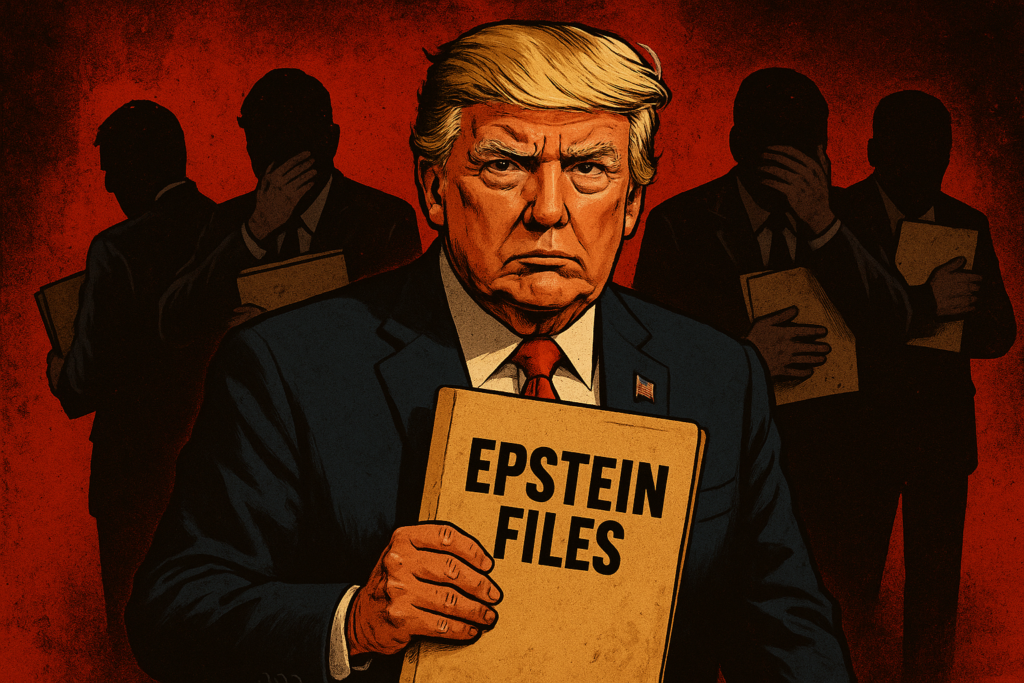Habari News Analysis
For years, Donald Trump has tried to wave away questions about his relationship with Jeffrey Epstein as old news or partisan smears. But a new batch of thousands of pages of documents and more than 2,000 email messages from Epstein’s estate—now in the hands of Congress—has pulled Trump’s name back to the center of the story.
The documents don’t show Trump directly emailing Epstein. Instead, they reveal how often Epstein and his circle talked about Trump: his power, his public image, and, in some cases, an alleged connection to one of Epstein’s trafficking victims. At the same time, a bitter political fight has erupted in Washington over whether all remaining “Epstein files” held by the Justice Department should be made public.
This piece breaks down what’s actually in the new emails, who is voting to release the rest of the files, who is trying to slow or stop that effort, and which messages involving Trump are raising the biggest questions.
What Are the “New Epstein Emails”?
The latest documents come from productions by Epstein’s estate to the House Committee on Oversight and Accountability, obtained under subpoena in 2025. Democrats on the committee first released a set of emails that highlight Epstein’s comments about Trump. Republicans then answered by posting a much larger cache—more than 20,000 pages, including some 2,300 emails covering the years roughly from 2008 to 2019. (Oversight Democrats)
Key points about the cache:
- Trump is mentioned frequently, but doesn’t appear as a sender or recipient. The Wall Street Journal reports that Trump’s name shows up in more than half of the email threads, usually as the subject of discussion or in news links Epstein and his contacts forwarded to each other. (Wall Street Journal)
- The emails involve some of the most powerful people in politics, finance, and media. Among the names appearing in correspondence are former Treasury Secretary Larry Summers, publicist Peggy Siegel, Israeli ex–Prime Minister Ehud Barak, billionaire Peter Thiel, former Trump strategist Steve Bannon, author Michael Wolff, and former White House counsel Kathryn Ruemmler, as well as British royal Prince Andrew. (Wall Street Journal)
- The documents are part of a broader congressional push. These emails sit alongside other records—flight logs, court filings, and Epstein’s notorious 50th-birthday “First Fifty Years” tribute book—that Congress has been gradually prying loose from the estate and from federal agencies. (Wikipedia)
The new material doesn’t, by itself, prove crimes by Trump. But it does show Epstein repeatedly discussing Trump in ways that suggest he believed he had leverage over the future president—and that others in his circle saw Trump as a key figure to manage, protect, or spin in the media.
The Three Most Explosive Emails About Trump
1. The 2011 “Dog That Hasn’t Barked” Email
One of the most discussed messages is an April 2011 email from Epstein to Ghislaine Maxwell, marked “high importance.” In it, Epstein refers to Trump as “the dog that hasn’t barked” and writes that a trafficking victim—her name is redacted in the public release—“spent hours at my house with him.” (ABC News)
People familiar with the documents told The Washington Post that the victim is Virginia Giuffre, who has long alleged that she was recruited at Trump’s Mar-a-Lago resort at age 17 and later trafficked by Epstein and Maxwell. (The Washington Post)
Epstein complains in the email that Trump “has never once been mentioned. police chief, etc. I’m 75% there,” implying he believed he had information that could be used against Trump but had not yet surfaced publicly. Maxwell replies: “I have been thinking about that …” (Wikipedia)
Important context:
- The email reflects Epstein’s own words and claims; it has not been independently corroborated in court.
- Trump has denied wrongdoing in connection with Giuffre and Epstein, and his representatives say Democrats are cherry-picking documents to smear him. (Wikipedia)
2. The 2015 Michael Wolff Exchange
Another striking series of emails involves journalist and author Michael Wolff, known for his insider books about Trump and other political figures. In December 2015, as Trump was rising in the Republican primaries, Wolff wrote to Epstein that he had heard CNN planned to ask Trump on air about his relationship with Epstein. (Wikipedia)
Epstein then asked Wolff what Trump should say “if we were able to craft an answer for him.” Wolff replied the next day with speculation about how the relationship might be spun publicly and what Trump likely would (and would not) be willing to admit. (Wikipedia)
Ethics experts say the exchange raises troubling questions about a journalist privately coaching a political figure’s response on a matter as serious as association with an accused sex trafficker, particularly while presenting himself as an independent observer in public. (Al Jazeera)
3. The 2017 Email Calling Trump “Dangerous”
In a February 2017 email—just weeks after Trump’s inauguration—Epstein wrote to former Treasury Secretary Larry Summers, calling Trump “the worst person he’d ever known” and “dangerous.” (People.com)
The email appears in a trove of more than 20,000 pages released by the House Oversight Committee. According to reporting, Epstein criticized Trump’s character, worried about his fitness for office, and discussed how Trump’s presidency might affect their shared social and financial circles. (People.com)
Again, this is Epstein’s opinion, not evidence of a specific crime. But put together with earlier messages, it undercuts portrayals of Epstein as merely a distant acquaintance of Trump and suggests a long, complicated history between the two men.
How Deep Is Trump in the Broader “Epstein Files”?
Beyond individual emails, the broader record shows several important threads:
- Frequent Mentions in Strategy Conversations – Epstein and his associates regularly passed around news about Trump’s campaigns, legal troubles, and scandals, discussing how those events might affect Epstein’s own reputation and contacts. (Wall Street Journal)
- The 50th-Birthday Book – In 2003, friends assembled a “First Fifty Years” tribute book for Epstein. A Wall Street Journal investigation reported that the album included a letter attributed to Trump with a crude drawing and a closing line—“may every day be another wonderful secret.” Trump has called the letter a forgery and sued the paper for publishing its description, while Congress has posted a full digital copy of the album as part of its records. (Wikipedia)
- Trump’s Public Reaction – As the files have emerged, Trump has repeatedly denounced the entire controversy as the “Jeffrey Epstein hoax,” comparing it to the Russia investigation and the Steele dossier and urging his supporters not to “waste time and energy” on it. Fact-checkers note that these characterizations are misleading: the records in question are real documents produced by Epstein’s estate and federal agencies, even if some allegations remain unproven. (Wikipedia)
- Allegations of Prior Knowledge – Outlets like The Guardian and The Washington Post report that the 2011 email to Maxwell and other messages “suggest” Trump may have been aware of Epstein’s abuse, at least regarding the victim referenced in the email. To date, there has been no public criminal charge tying Trump directly to Epstein’s trafficking network, and Trump continues to deny such knowledge. (The Guardian)
In short: Trump is not just a cameo in the Epstein archive; he’s one of the most frequently discussed figures. But most of the evidence so far is circumstantial, embedded in Epstein’s own words and the gossip of his circle.
Who Is Pushing to Release the Rest of the Epstein Files?
The battle over transparency is playing out on Capitol Hill, and it has produced some unusual political alliances.
The Discharge Petition
- Rep. Thomas Massie (R-Ky.) filed a discharge petition on September 2, 2025, to force a House vote requiring the Justice Department to release all non-classified Epstein-related documents. (Office of the Clerk)
- For weeks, the petition hovered at 217 signatures—all House Democrats plus three Republicans:
- Rep. Nancy Mace (R-S.C.)
- Rep. Lauren Boebert (R-Colo.)
- Rep. Marjorie Taylor Greene (R-Ga.) (Wikipedia)
- The decisive 218th signature came from Rep. Adelita Grijalva (D-Ariz.), sworn in on November 12 after a lengthy delay. Grijalva signed the petition as one of her first official acts, telling survivors in the gallery that “justice cannot wait another day.” (AP News)
Once a discharge petition hits 218 signatures, House rules require a floor vote within a set number of legislative days. That means the chamber is now on the clock to decide whether the public will see the remaining files.
Epstein Files Transparency Legislation
Alongside the petition, there’s also:
- H.R. 4405 – The Epstein Files Transparency Act, introduced by Rep. Ro Khanna (D-Calif.), with two dozen co-sponsors, mostly Democrats. The bill directs federal agencies to declassify and release as many Epstein-related records as possible, with limited redactions for privacy and security. (Congress.gov)
- H.Res. 577, a House resolution “demanding the immediate release of all Federal documents relating to Jeffrey Epstein,” which expresses the chamber’s sense that secrecy around the case has gone on too long. (Congress.gov)
Victims’ advocates argue that full disclosure is the only way to understand how Epstein operated for so many years with apparent impunity and who enabled or protected him. Several survivors have publicly urged lawmakers of both parties to vote yes. (TIME)
Who Is Trying to Slow or Stop the Release?
Donald Trump
Trump has been the most vocal opponent of the transparency push:
- He has repeatedly labeled the effort a “Democrat hoax” and warned Republicans that only a “very bad, or stupid, Republican” would join Democrats in voting for the files’ release. (Newsweek)
- According to TIME and other outlets, Trump has personally pressured House Republicans to oppose the discharge petition and upcoming vote. (TIME)
- He recently withdrew his political support from Rep. Marjorie Taylor Greene, once a staunch MAGA ally, after she became one of the leading Republican voices demanding that the Epstein files be released in full. Greene accused Trump of “fighting this hard to stop the Epstein files from coming out” and trying to make an example of her to scare others in the GOP. (Al Jazeera)
House Republican Leadership
Speaker Mike Johnson has sent mixed messages:
- Publicly, Johnson now says he will not block a vote on releasing the files. (The Guardian)
- But for weeks, he kept the House in recess during a government shutdown and delayed swearing in Adelita Grijalva—moves critics say were designed to prevent her from adding the crucial 218th signature to the discharge petition. (The Guardian)
Johnson argues that the petition is unnecessary because the bipartisan House Oversight Committee is already releasing batches of material and that Congress must balance transparency with privacy and due process concerns. (The Guardian)
Justice Department and Executive Branch
The Justice Department has been cautious and, in the eyes of some lawmakers, slow:
- ABC News reports that DOJ officials say they must review each document for ongoing investigations, victims’ privacy, and national security before release—standard but time-consuming steps. (ABC News)
- Some conservatives have accused the department of dragging its feet, while Democrats point to conflicting statements from the Trump administration about whether it actually wants the records released. (Al Jazeera)
What Has Already Come Out Besides Emails?
Apart from the new emails, other records recently made public include:
- Epstein’s 50th-birthday “First Fifty Years” book, now posted online by the House Oversight Committee. The album contains letters from Epstein’s friends, including ones attributed to Trump and former President Bill Clinton. Trump has denied the authenticity of the letter bearing his name and filed a multibillion-dollar lawsuit against The Wall Street Journal for describing it. (Wikipedia)
- Prior deposition transcripts and flight logs, many released through earlier civil cases and the prosecution of Ghislaine Maxwell, show Trump appearing as a social contact of Epstein in the 1990s and early 2000s but do not, by themselves, establish criminal conduct. (Wikipedia)
These documents form the backdrop for why the new emails are drawing such intense scrutiny: they plug into a broader pattern of elite figures orbiting Epstein for years while his abuse continued.
What Happens Next?
Under House rules, the successful discharge petition means a vote on releasing the remaining Epstein files must occur within seven legislative days. (The Washington Post)
Several big questions remain:
- How many Republicans will join Democrats? Analysts expect at least the four Republicans who signed the petition—Massie, Mace, Boebert, and Greene—to vote yes. Others may follow if they feel pressure from constituents demanding transparency, despite Trump’s public warnings. (TIME)
- What will be redacted? Even if the bill passes, agencies will likely black out the names of some victims and possibly individuals who were investigated but never charged. Advocates will watch closely to see how far the redactions go. (Congress.gov)
- How will Trump respond? If Congress sends a transparency bill to his desk, Trump could sign it, veto it, or try to negotiate changes. His past statements strongly opposing the effort suggest a clash is coming. (The Guardian)
The Bottom Line
The new Epstein emails don’t offer a neat, smoking-gun narrative about Donald Trump. What they do show is that:
- Epstein believed he had potentially damaging information about Trump and discussed that with his closest confidantes.
- Journalists, political insiders, and elites in Epstein’s circle treated Trump as a figure whose image and exposure needed to be carefully managed.
- Trump is now leaning heavily on his political influence to slow or stop the full release of the remaining Epstein files, even as members of his own party break ranks to demand transparency.
For survivors and advocates, the stakes go far beyond Trump himself. They see the Epstein archive as a map of how power, money, and secrecy can shield abusers and the networks around them. The coming vote in Congress will decide how much of that map the public is allowed to see.
Habari News will continue to follow the story as more documents are unsealed and as the political fight over the Epstein files—and Trump’s place in them—intensifies.










More Stories
MS-13 Gang Member Who Confessed to 5 Murders Arrested Just Weeks Before Spanberger Ended ICE Cooperation
Suspect Arrested After Deadly Morning Shooting at Phoenix Restaurant Near 27th Ave & Indian School
Person Trapped After Chevy Silverado Flips in Crash; Southbound Traffic Blocked Near Local Church